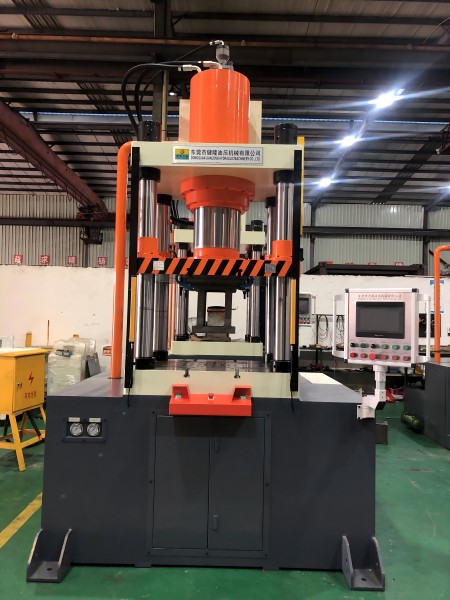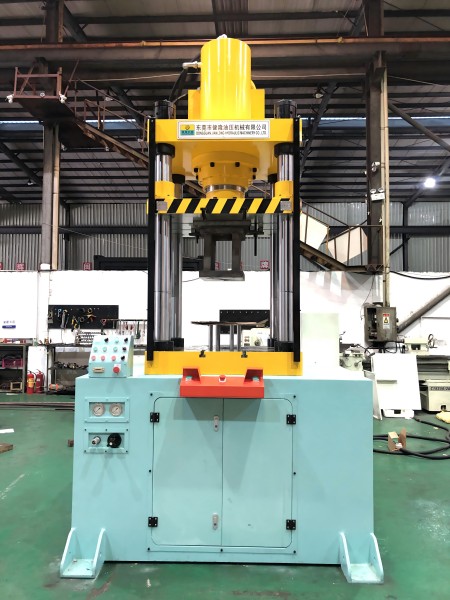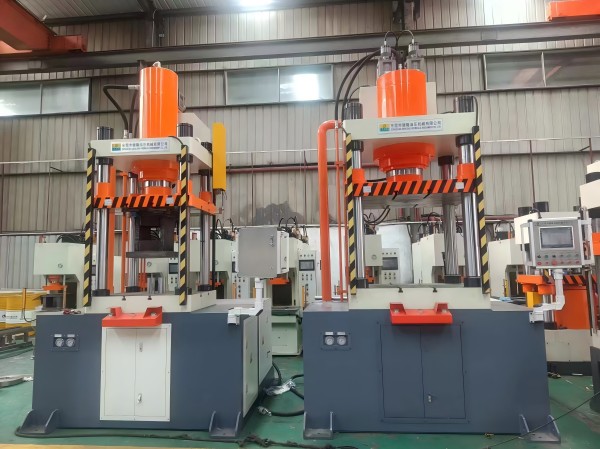Abnormal noise of hydraulic press is one of the common problems in hydraulic system, which may affect the normal operation of equipment and even cause failure. Understanding the causes of noise and its treatment methods can help to find and eliminate problems in time and ensure the normal use of hydraulic press.

1. Causes of abnormal noise of hydraulic press
1.1 Hydraulic pump failure: Problems such as wear of internal parts of hydraulic pump, bearing damage or air mixing in the pump will cause abnormal noise when the pump is working. Long-term operation of hydraulic pump under high load or improper working conditions is prone to these problems.
1.2 Air mixed into hydraulic system: When air is mixed into the hydraulic system, bubbles will form. When these bubbles flow to the high-pressure area with the oil, they will burst under pressure and produce noise. This phenomenon is usually called "cavitation" or "cavitation phenomenon".
1.3 Inappropriate oil viscosity: Too high or too low viscosity of hydraulic oil will increase the flow resistance of the hydraulic system when it is working, resulting in greater flow noise. When the oil viscosity is too high at low temperature, the increased resistance when starting the hydraulic pump will also cause noise.
1.4 Pipeline vibration: Improper installation of pipelines in the hydraulic system, loose fixation or loose brackets will cause the pipelines to vibrate and generate noise as the oil flows. In addition, excessive bending and unreasonable layout of the pipelines may also cause noise.
1.5 Hydraulic valve failure: Wear of internal parts of the hydraulic valve, spring failure or valve core jamming will cause abnormal noise when the valve is working. In addition, improper valve pressure adjustment or system pressure fluctuations will also cause noise problems.
1.6 Hydraulic oil contamination: Impurities mixed in the hydraulic oil or oil deterioration will cause wear or blockage of components in the hydraulic system, generating friction noise or flow noise.
1.7 Mechanical component failure: Mechanical components of the hydraulic press, such as bearings, gears, connecting rods, etc., if worn or poorly lubricated, will also cause noise during operation.
1.8 The pump or motor does not match the system: The model and specifications of the hydraulic pump or motor do not match the hydraulic system. During operation, excessive load or high speed may occur, resulting in noise.

2. Treatment of abnormal noise
2.1 Check the hydraulic pump: Check the internal wear of the hydraulic pump regularly. If the bearing or gear is worn, it should be replaced in time. In addition, check whether there is air mixed in the pump and exhaust it if necessary.
For pumps with abnormal noise, it is recommended to stop the machine for inspection or replace with a new pump.
2.2 Exhaust air: Exhaust the air in the hydraulic system through the exhaust screw or other exhaust device, especially after the system is refueled or repaired for the first time, it should be exhausted thoroughly. And strengthen the seal of the hydraulic system to prevent air from mixing again.
2.3 Check the viscosity of the oil: Select the appropriate hydraulic oil according to the design requirements of the hydraulic system. For hydraulic systems in low temperature environments, use hydraulic oil suitable for low temperatures. If the oil viscosity is found to be inappropriate, it should be replaced with a suitable oil type.
2.4 Fix the pipeline: Check the pipeline layout of the hydraulic system, ensure that the pipeline bracket is firm, and eliminate the looseness or vibration of the pipeline. Adjust the layout of the pipeline to avoid excessive bending. And install vibration pads or mufflers to reduce the noise caused by pipeline vibration.
2.5 Maintain hydraulic valves: Regularly check the internal parts of hydraulic valves, clean impurities and replace worn parts to ensure smooth movement of the valve core. Adjust the valve pressure to the appropriate range. For hydraulic valves with obvious noise, it is recommended to replace or recalibrate.
2.6 Filter hydraulic oil: Regularly replace hydraulic oil and filter element to ensure that the hydraulic oil is clean and avoid noise caused by oil contamination. If the hydraulic oil is found to be seriously contaminated, the system should be cleaned and the oil should be replaced immediately.
2.7 Maintain mechanical parts: Regularly check the mechanical parts of the hydraulic press, especially the wear of bearings, gears and other parts, and add lubricating oil or replace damaged parts in time. For parts with severe wear or lubrication failure, it is recommended to stop the machine for inspection or replacement.
2.8 Match pumps and motors: Check the model and specifications of the hydraulic pump and motor to ensure that they match the hydraulic system. If the speed of the pump or motor is too high, it should be solved by adjusting the transmission ratio or replacing the equipment. If the equipment is found to be mismatched, it should be replaced with a suitable model.

Abnormal noise of hydraulic presses may be caused by many reasons, including hydraulic pumps, valves, pipelines, oil and other links. By regularly checking and maintaining the hydraulic system, removing air, using appropriate hydraulic oil, fixing pipelines and correctly matching equipment, the occurrence of noise problems can be effectively reduced, ensuring the stable operation of the hydraulic press and the quietness of the working environment. If you have any questions about the above information or need more detailed information, please feel free to tell us and we will serve you wholeheartedly.
Contact: Jessie
Phone: 18988729072
E-mail: lifuyan45@gmail.com
Whatsapp:+8618988729072
Add: Guangyi Industrial Park, No.2 Jinfu West Road, Tanglip, Liaobu Town, Dongguan City, Guangdong Province, China
We chat
